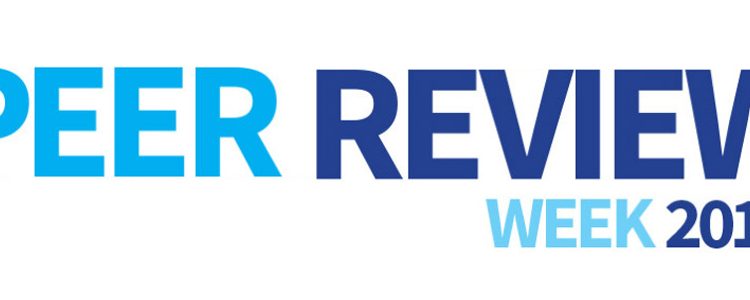Peer Review Week 2016: Recognition for Review

One of the motivations behind Peer Review Week 2015 was to highlight the amount of work that scientists do as peer reviewers and how vital that work is to the scholarly communication process. This year, this issue has become the defining theme of the week and the events are primarily focused on two questions: how to acknowledge and celebrate reviewing as crucial work, and how to build formal procedures for peer reviewers that gives them public, recognizable credit for their work.
A centerpiece of the Recognition for Review theme is the Sentinels of Science Awards being held by the Publons blog. Publons is a platform dedicated to showcasing peer review activities, allowing researchers to record and publicly acknowledge the amount of time they spend peer reviewing articles, job applications and funding proposals. The platform exists because they believe that peer reviewers are the last bastion of scientific quality, rejecting false and bad science and ensuring that only excellent research that advances human potential and knowledge is published. The Sentinels of Science awards will recognize those on the Publons platform who have contributed the most to their field in terms of reviews, with prizes and an official badge on their Publons profile.
Online Events for Peer Review Week
The Sentinels of Science Awards is merely a one-off event; however, the wider aim of Peer Review Week is to find more permanent and widely recognized forms of recognition and credit for review activities that are not tied to a single platform.
Such conversations will, for the most part, take place online through ongoing chats on social media using the hashtag #RecognizeReview and through more formal events including webinars, online Q&As and panel discussions.
This year there will be seven webinars held by a wide range of blogs and online platforms—a significant increase from a single webinar in 2015! They begin on Monday, 19th September at ScienceOpen, one of the founders of Peer Review Week with a virtual panel of four experts from the scholarly publishing world discussing the future of peer review and recognition for review in a general sense.
On Tuesday, 20th September, this will be followed by a webinar held by the Council of Science Editors that will focus on concrete examples of how publishers today are working with scholars and online platforms like ORCID to give credit for peer reviews and explicitly connect peer review activities to the wider research activities of scholars. This event will include representatives from Elsevier and The Royal Society, and hopes to consider how these efforts can be improved and expanded.
These webinars will be complemented by some less traditional online activities, such as the open peer review Q&A blog being maintained by Jeremy Sanders, Editor-In-Chief, Royal Society Open Science.
In Person Events for Peer Review Week
In addition to the online events, there will be in-person events being held across the globe for the first time. This first of these will be held on 15th September at Heathrow, London, during the ALPSP conference where a panel will be dedicated to discussing new and experimental forms of peer review, focusing on how the quality of peer reviewers can be assessed and verified..
Another event will also be broadcast live online from Ottawa, Canada on Wednesday, 21st September, where three expert researchers and publishers will be discussing various perspectives on peer review. On Thursday, 22nd September, there will be an informal events held at the Frontiers office in London.
Peer Review Week 2016 looks to be an informative and exciting week of debate, discussion and new ideas. With the involvement of organizations such as , The Royal Society, Elsevier and Wiley, and public engagement platforms such as The Scholarly Kitchen and Sense About Science, the week aims to celebrate peer reviewers and the peer review process in both the academic and public spheres and build a new culture of credit and recognition.









